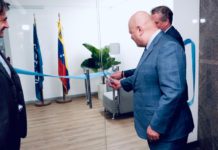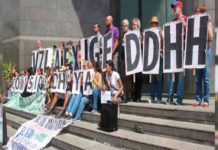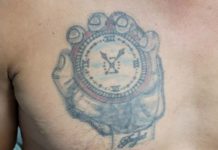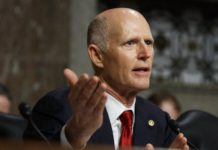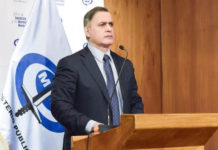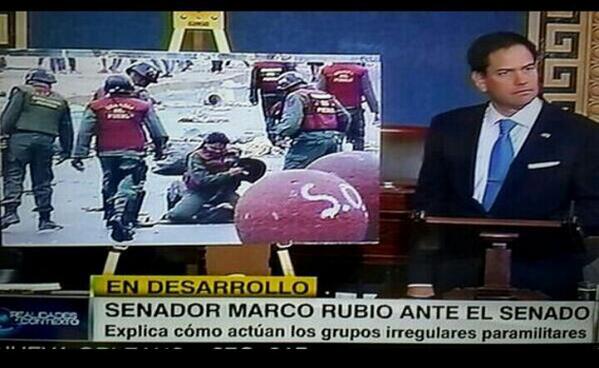
27/03/2014
Marcos Castillo || [email protected]
Mostrando fotografías sobre todos los acontecimientos que han ocurrido en Venezuela durante el último mes y medio, el senador estadounidense Marco Rubio pidió al Senado de EEUU actuar contra el Gobierno de Nicolás Maduro y sus funcionarios y propuso sancionar a quienes tengan “bancos, mansiones y fortunas en ese país” y que estén ligados al mandatario nacional.
Con gigantografías sobre las marchas opositoras y las agresiones que han sufrido muchos venezolanos por parte de efectivos de la Guardia Nacional Bolivariana y cuerpos policiales del estado, Rubio pidió a sus homólogos actuar ante esta situación durante una polémica intervención por lo fuerte de sus denuncias y declaraciones.
“A lo largo de esta semana estaré preparando propuestas e ideas sobre lo que nosotros necesitamos hacer, las sanciones que debemos establecer en contra de los individuos responsables de estas atrocidades”, enfatizó el legislador.
Rubio calificó como “criminal” al presidente de la Asamblea Nacional de Venezuela, Diosdado Cabello, y criticó que EEUU otorgue fondos a la Organización de Estados Americanos (OEA) “si no puede solucionar un problema en nuestro hemisferio”.
Tras una extensa crítica a la dictadura cubana, aseguró que lo que mejor saben hacer los Castro es reprimir al pueblo cubano y que ese método de control lo exportan. “Han exportado represión, en tiempo real y en nuestro hemisferio, ahora mismo”, dijo visiblemente molesto, antes de pasar a enumerar las denuncias sobre Venezuela.
La primera fotografía que mostró el senador por Florida fue la del dirigente opositor Leopoldo López cuando era apresado por la GNB en Caracas. Denunció que fue detenido solo por protestar contra el Gobierno de Maduro y calificó a los funcionarios venezolanos como unas “marionetas” de La Habana. Añadió que agentes militares cubanos están infiltrados en este país a cambio del petróleo barato y gratis que se le provee.
El asesinato de la estudiante y modelo carabobeña Génesis Carmona fue la segunda denuncia de Rubio ante el senado. “Ella es una reina de belleza y estudiante en Valencia y está en esa motocicleta porque el Gobierno de Venezuela y los criminales llamados grupos civiles que ellos armaron, otra exportación de Cuba, le dispararon en la cabeza”.
Una imagen con seguidores de Leopoldo López siendo reprimidos por una ballena de la GNB fue la tercera mostrada al Senado. Rubio denunció que está situación está ocurriendo desde hace dos semanas. “Cañones de agua tumbando a gente al piso. ¿Por qué? Porque protestan contra el Gobierno.
La imagen del traslado del estudiante Bassil da Costa herido mortalmente también fue mostrada por Rubio, quien aseguró que el joven fue asesinado por fuerzas de seguridad y grupos pregobierno en Caracas.
Reprochó que sólo tres jefes de Estado del Hemisferio se hayan pronunciado sobre lo que está ocurriendo en Venezuela. “Es vergonzoso que muchos miembros del Congreso viajaran a Venezuela, fuesen amigos de Chávez y asistieran a su funeral y estar sentados sin decir nada mientras todo esto ocurre”.
http://www.el-carabobeno.com/portada/articulo/78202/rubio-desnud-realidad-venezolana-ante-senado-de-eeuu
RUBIO DELIVERS FLOOR SPEECH ON CRISIS IN VENEZUELA
Rubio: “I hope we can get passage of [the legislation] here on the floor so we can send a clear signal to the people of Venezuela: The people of the United States of America are on your side, we support your cause, we will not forget what you are going through, we will not abandon your aspirations. We stand for the liberty and the freedom of all people, including those who do not live here with us.”
U.S. Senator Marco Rubio
Senate Floor Speech
March 27, 2014
Note: CNN en Español did the following live translation to Spanish, starting at the speech’s :40 second mark: http://bit.ly/1rGOlDW
The reason why I come to the floor today is to call attention to a crisis that has fallen off of the front pages over the last few weeks and that’s the situation in our own hemisphere that’s occurring in Venezuela. And I recognize there’s been new stories about an airline that’s been tragically potentially lost or has been lost, we don’t know the full outcome of that yet. I know that the situation with Ukraine has captivated the attention of the public, and rightfully so. And I’m pleased to see today that the Senate has taken important steps towards addressing that issue.
But I want to talk about something that’s happening in our own backyard, in our own hemisphere. In fact, something that is impacting hundreds of thousands of people that live in Florida because they have family members who still live in the country of Venezuela.
Since February 4 of this year, Venezuelans have been taking to the streets to complain about their government. And these Venezuelans are from all walks of life, but it’s truly been motivated by young people, by students. The origins of this public discontent are important to understand because they are not just purely political.
It, in fact, has to do with the dysfunction and the failures of the government that’s currently in charge of that country, and the statistics bear out that dysfunction and their failures. For example, violence and insecurity is among the highest in the entire Western Hemisphere. The murder rate in Venezuela is 79 per 100,000 people in 2013. In the city of Caracas, the capital of Venezuela, the murder rate is actually almost double that, it’s 122 per 100,000, making it one of the most dangerous cities on Earth.
The unbridled corruption that exists in terms of how state assets are used. Venezuela’s an oil-rich country. There are individuals in that government that have empowered themselves of Venezuela’s oil, not their oil. And are basically giving it away to countries like Cuba, and others, and using it as their own personal piggy bank, both for personal enrichment but also to fund their governmental operations at the expense of the people of Venezuela. Their inflation rate is 57%. In fact, this week, Fitch, Fitch Ratings, they lowered Venezuela’s sovereign debt rating into junk territory, from B+ to B and they warned, by the way, that further downgrades are on the way.
There’s also this unprecedented scarcity of basic goods, including food staples, even things like toilet paper there’s a shortage of. I want to show you some graphics here. This is a line of people waiting in the city of San Cristobal to gointo a supermarket. But we’re talking about a rich country here. This is not a third world country. This is not a nation that is poor. This is a revenue-rich nation. This is a resource-rich nation, among the most resource-rich on the planet. And here’s a line of people waiting to go to a grocery store. Reminiscent of Cuba, for example, a country whose model this government follows. We’ll talk about that more in a moment.
Let me show you some store shelves inside of a Venezuelan supermarket. Completely empty. Nothing on the shelves. This is the economic reality of the failure of the Maduro-Chavez government in Venezuela today. And this, among other things, is what people have taken to the streets to demonstrate.
By the way, there was another catalyst for all of this. There was a sexual assault that occurred on a college campus and students were protesting against law enforcement’s unwillingness to address that assault. And the government cracked down. But not on the sexual assaulters, not on the perpetrators, on the demonstrators.
And so all of these things that we’ve talked about — the failure of that state, the lack of democratic opening, the political abuses, the corruption, and the economic disaster of the Venezuelan government — led to demonstrations that began on February 4 and continue throughout the country. I want to show you a picture of what those demonstrations look like. It is estimated that hundreds of thousands of people took to the streets to protest, and they were protesting the things I’ve outlined already — the insecurity, the violence, the scarcity of basic goods, the lack of opportunity, the political repression.
Meanwhile, Nicolás Maduro, the president of that country, and all of his cronies, live a life of luxury. And we’re going to talk about that more in a moment, because this government is surrounded by individuals who are living lives of luxury, not just in Venezuela but in Florida. While the people take to the streets, and you saw the empty store shelves, there are people tied to the government in Venezuela buying gold-plated iPads. I didn’t even know there was such a thing. In Miami, investing in enormous properties and mansions, with the money that they are stealing, with the help of the Maduro government, from the people of Venezuela, leading to these protests.
So what has been the response of the Maduro government? What has been the response to these legitimate complaints about what is happening in Venezuela? I’m going to show you some images of what the response has been from the government.
Here is the first. Here is their National Guard. Here is their National Guard battling with students in the streets, fully equipped with riot gear, ready to battle against them. This has been their response, repression at every turn in multiple cities.
Here is the other response — tear gas. Tear gas by a fully armored individual firing tear gas canisters into the crowd. Let me talk about the tear gas for a moment. Let me show you this canister. This canister that was used against peaceful protesters actually has a marking, it says ‘Hecho en Brazil. Made in Brazil.’ And there have been reports in fact that there’s been some U.S. manufactured tear gas being used against protesters in the street in Venezuela.
But if it stopped at tear gas, it would be one thing, but it has not stopped at tear gas. In fact, it is now known that the Interior Ministry of Venezuela authorized snipers to travel to Táchira state and fire on demonstrators. Here is a picture of a government official, of a law enforcement or army or National Guard individual, or Interior Ministry individual, on a rooftop with a rifle and a scope aiming into a crowd.Here is a picture of a sniper. It doesn’t end there. Those aren’t the only pictures we have. Here are more pictures of more snipers on rooftops. Here is another sniper aiming into the crowd, with a spotter next to them. Here is another picture of the same sniper blown up.
These are government-sponsored individuals. What civilized [country] on Earth sends the National Guard and the Interior Ministry of their own government, of their own country, with snipers to fire on their own people who are demonstrating because of the lack of freedoms and opportunity and economic degradation that exists in a country? They cannot deny this. Here are pictures taken by demonstrators themselves of the snipers ready to shoot down people. In fact, 36 people have lost their lives.
But it doesn’t end just with the government snipers. Because what the government is trying to do here to hide their involvement is they have organized these pro-government militia groups, basically, these militant groups that they hide behind. These groups don’t wear uniforms. They’re called ‘colectivos.’ They drive around the city in motorcycles, and they assault protesters, they break in and vandalize their homes, they have weapons that they use to shoot into the crowds and kill or harm people.
There are three main groups. By the way, these groups began under Hugo Chavez’s reign, and these groups are actually organized around a concept that has existed for years in Cuba — these committees to defend the Revolution. These are neighborhood groups, so they know your family, they know who you are, they’re always watching, and they organize themselves into armed militias. The government’s claim is, ‘Well, these groups are on their own, we’re not coordinating with them,’ but in fact, there have been multiple reports that these groups coordinate with the National Guard to take down barricades set up by protesters, to break into the homes of protesters, to vandalize homes, to terrorize people, and to kill.
There are three main groups that I want to point out, these ‘colectivos.’ La Piedrita is one of them, it’s based in a working class neighborhood of Caracas. It has a far-left ideology, it is armed, it is comprised of radicals, who claim to be willing to die for their revolutionary ideals, whatever those are. In January, this group, by the way, tweeted that Henrique Capriles, the opposition party’s nominee for president in the last elections, is a racist and a fascist and accused him of intending to launch attacks on the poor and on impoverished neighborhoods.
Another ‘colectivo,’ the Patriotic Force of National Liberation. This group bases its teachings on a leftist revolutionary and murderer by the name of Che Guevara.
A third group is the Tupamaro Revolutionary Movement. This is an armed, communist, political and militant organization that also operates out of Caracas. These are just three of these armed, ununiformed, thuggish, criminal groups that operate under the auspices and at the direction of the government of Nicolás Maduro and the people that surround him.
So what is the result of this? The result of this is there’s been over 1,800 people detained in Venezuela since this began last month. Over 450 people have been injured. Over 50 people have been tortured while detained, that we have reports on. And over 36 people have been killed. This is not happening in a continent halfway around the world. This is happening in our hemisphere right now, in real-time. And these numbers, they just summarize the depth and the scope and the breadth of what’s happening in the regime’s brutality in Venezuela. But these aren’t just statistics. Behind every single one of these — behind the 36 that have been killed, behind the 1,800 that have been detained, behind the 450 that have been injured — are real people with names and families and fathers and mothers and brothers and sisters and children.
And I want to tell you the story of a couple of them. The first is Marvinia Jimenez. Here you see her on her knees as part of a peaceful protest. And here you see an armed individual with a pistol pointed at her. She is on her knees, poses no threat, has given herself up as a peaceful protester as she confronts an armed individual associated with the government holding a pistol. What happens next in these pictures is these armed individuals from the Defense Ministry — from the Interior Ministry — grab her by the wrist and head and they subsequently throw her to the ground. And here’s what they do when she is on the ground. This individual here, female member of the interior ministry, takes off her helmet and proceeds to beat her in the head with that helmet. Here is the picture. This is real. This is not a movie. This is happening. This is happening now.
This happened to Marvinia Jimenez and luckily someone caught it on their phone and was able to capture these images. These are uniformed individuals associated with the government. You saw she had given herself up and was on her knees. And this is what happens, she gets beat in the face with a helmet. She lived to tell her story. But there are others that have not been so fortunate.
Here is Geraldine Moreno, she was a college student in the city of Valencia. On February 19, she stepped outside of her home to see what was going on during an anti-government protest. And six National Guard members — six National Guard members of the Maduro government — came by on a motorcycle to break up the protest. As the demonstrators fled, they fired into the crowd and she was hit by gunfire and fell to the ground. She struggled to get up, and just then, one of the National Guard members came up and shot her in the face at pointblank range and killed her. Geraldine is someone’s daughter. In fact, she is not just anyone’s daughter. She is Rosa Orozco’s daughter. And Rosa has lost her daughter forever. This is the youth of Venezuela, this is supposed to be Venezuela’s future and they’re being indiscriminately mowed down in the street by the government of their own country.
There are some inspiring stories, too. This is Maria Corina Machado, a member of the Venezuelan opposition party in Parliament. She was here in Washington this week. She has bravely spoken out against these things going on in Venezuela, and bravely the government of Panama gave her the space to speak out on behalf of the people of Venezuela at a recent O.A.S. meeting. But shamefully, the rest of the countries who are members of the O.A.S. — not the U.S. or Canada — but every other country did nothing to defend her right to speak. And she was denied the right to tell the world the truth about what’s happening. She could have stayed in exile and asked for political asylum, but you know what this brave young woman did? She got on an airplane and flew back to Venezuela to her country to continue the fight there peacefully as a member of their Parliament, as a member of the opposition party.
Well, when she arrived, she was immediately detained at the airport in Caracas. She was questioned by the thugs you just saw, who no doubt tried to intimidate her in that questioning. She was verbally attacked by government supporters at the airport. And then she got in her car to leave to go to her destination and these same thugs tried to run her car off the road. They are so incompetent that they couldn’t even carry that out, thankfully. She finally made it to her destination. And then guess what happens this week? The speaker of their so-called National Assembly, an individual by the name of Diosdado Cabello, a Maduro-loyalist, a criminal, decided to remove her — to basically just expel her from the National Assembly. She’s no longer a member of the National Assembly, unilaterally dismissed by their equivalent of their assembly’s president, their Speaker.
And the O.A.S.’s response to this has been shameful. The Organization of American States has been downright embarrassing and shameful. I thought it was best summarized by the opposition leader, Leopoldo Lopez, who wrote in The New York Times on March 25, ‘The outspoken response from human rights organizations is in sharp contrast to the shameful silence from many of Venezuela’s neighbors in Latin America. The Organization of American States, which represents nations in the western hemisphere, has abstained from any real leadership on the current crisis of human rights and the looming specter of a failed state, even though it was formed precisely to address issues like these?’
Why do we even need an O.A.S., an organization of democratically elected governments? Why do we even need it? Why are we even members of it? Why do we even contribute funds of American taxpayers towards it if it cannot meet and address systemic human rights abuses such as these?
I am less than pleased, by the way, with our own government’s reaction. This is not a partisan issue, but I have to say this. President Obama has expressed he’s ‘concerned’ about this. To his credit, the Vice President was stronger in condemning the Maduro regime. We’re not just ‘concerned’ about this. We should be outraged about this. Just as we’re outraged when things go wrong in other parts of the world and weigh in with sanctions — and we should. And our voices — and we should. This is happening in our own hemisphere, right underneath our nose, and it is shameful that the leadership of our government has so far not done more to address this. But we can change that. And I’m hoping that we will.
What I hope to do over the next few days is to propose specific sanctions against individuals and companies associated with the Maduro regime so they know there are consequences for what is happening here. And you think our sanctions have an impact on Russia and its violations of Ukrainian sovereignty?
And I ask what I did a few weeks ago in a speech on this subject. If the United States of America will not stand up and be a strong voice on behalf of people who all they seek is freedom and liberty that our own founding documents say belong to all people, rights given to them by their Creator — if the United States of America will not be a forceful voice, what nation on Earth will? They look to us. Our own model of freedom and our republic inspires people. We say that we stand for these principles. We need to defend them when they are threatened, especially in our own backyard.
And so I hope that in the weeks to come we can pursue these targeted sanctions against some of these individuals associated with the government. Like the Assembly President, Diosdado Cabello, like others such as these individuals who we will come on the floor in the next few weeks and identify by name who benefit from the systematic violation of human rights in Venezuela, who are stealing money from the Venezuelan people, who are using the resources of that nation to enrich themselves. In the next few weeks, we will identify them by name and the properties they own and the assets they hold in our own nation. But I implore my colleagues not to ignore this issue. This is happening right now right in our own backyard, in our own hemisphere, and it is impacting real people at an extraordinary price. And so I hope in the weeks to come that I, along with Senator Menendez and others who have united behind us and with us, will be able to convince enough of my colleagues to take the next step. We’ve already unanimously passed a resolution condemning all this, and I thank my colleagues in the Senate for that. The next step is to build in real consequences for being a part of this. My colleagues, you will have an opportunity to be a part of this in the next few days, especially when we return next week.
And I hope we can get a hearing on these sanctions in the Foreign Relations Committee, and I hope we can get passage of it here on the floor so we can send a clear signal to the people of Venezuela: The people of the United States of America are on your side, we support your cause, we will not forget what you are going through, we will not abandon your aspirations. We stand for the liberty and the freedom of all people, including those who do not live here with us. And this is the thing we’re going to have a chance to do in the next few days. So I thank you for your attention on this matter, and I hope we can successfully take action.
Video solo en Inglés

